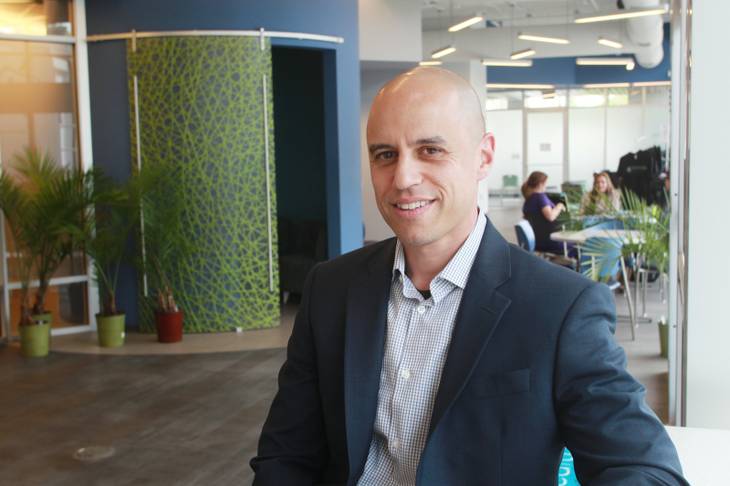After Cathy Brooks cut her leg at her downtown Las Vegas dog training business, the Hydrant Club, she became concerned when the wound started to swell and burn. Brooks snapped a photo and emailed it to her doctor, who asked to see her as soon as possible. But she couldn’t leave work, so her doctor and a staffer paid her an on-the-job visit, wrote her a prescription and outlined her care for the next 48 hours.
“I was shocked,” Brooks said. “They even asked if I had a tetanus shot recently. Because if not, they would bring one with them.”
Brooks is a member of the recently established Turntable Health, a membership-based primary care provider she found through an insurance plan she purchased on the Nevada Health Co-Op. Brooks’ two-pronged coverage includes Turntable, which opened a 7,000-square-foot medical office in December in downtown Las Vegas, and separate catastrophic
care. Brooks wouldn’t divulge the monthly cost of her Neighborhood VIP Gold insurance plan, but the San Francisco transplant said so far, Turntable’s service has been excellent, and the plan is about $300 a month less than what she paid for previous coverage.
Turntable is a concierge-style, membership-based primary care practice, and partnering with the co-op is an example of the evolution taking place in health care nationwide as President Barack Obama’s Affordable Care Act takes effect.
Brooks doesn’t pay Turntable’s $80 monthly fee out of pocket; the provider negotiated a flat rate to be paid by the co-op when customers pay their premiums.
Turntable Health, a newcomer among membership-based practices in the valley, has 400 patients, about a third of whom enrolled through the co-op. It offers unlimited access to a primary care physician (even through text, email or Skype) and his or her team. The team also includes a health advocate, social worker and nurse, and the program offers yoga, cooking, meditation and other health education classes at 701 Bridger Ave.
Its investors are Zappos founder Tony Hsieh and Dr. Zubin Damania, who was a primary care physician at Stanford University Medical Center for a decade before moving to Las Vegas a couple of years ago.
Damania said 10 years laboring under the fee-for-service structure by which insurance companies pay doctors left him a “disconnected, burned-out zombie.” Now, with Turntable, the focus is on wellness, and that, he said, will ultimately reduce hospital visits and the overall cost of patient care.
In its first four months, Damania said patient surveys show a 97 percent positive rating.
Potential to grow
Damania admits that co-op enrollees can help drive Turntable’s growth. Turntable currently has two salaried physicians. His goal is to grow to 5,000 patients and expand into the suburbs. Damania expects to need four physicians and more support staff to maintain the quality of care when Turntable hits its growth goal.
Another relative newcomer in membership-based primary care medicine in Las Vegas has taken an opposite approach — it hasn’t partnered with Obamacare exchanges or co-ops — yet.
MedLion Management, whose direct primary care model is similar to Turntable’s and costs $59 per month, has grown to 5,000 patients in Nevada since opening its doors a year ago.
CEO Dr. Samir Qamar said about 75 percent of its business comes as a tie-in with insurance plans similar to those offered by the Nevada Health Co-Op, but they are employer-sponsored.
“We thought because the rollout for exchanges was so shaky, we wanted to take a big step back and let the dust settle,” Qamar said.
MedLion operates in almost a dozen states, with 15 doctors in nine Nevada locations, growing its practice through the suburbs first. It will likely add a downtown clinic this year.
Qamar and Damania agree that their business model is poised for growth.
Qamar said more plans are being created for business owners with 50 or more employees in anticipation of the Jan. 1, 2015, compliance deadline mandated by the Affordable Care Act. By then, these employers will need to offer some form of insurance to employees, and it’s likely plans with membership-based primary care coupled with catastrophic care will be popular, Qamar said.
Maintaining the personal touch
Can a membership-based, primary care practice offering concierge-style services like Turntable keep up its availability to and personal treatment of its patients as its enrollment grows and as it expands into new business models?
MDVIP, a long-time concierge-like practice with a national reach and nine affiliate doctors in Nevada, has a 600-member cap for doctors in its network. Eschewing the concierge label, the model is described as a “personalized and preventive care practice” by one local MDVIP physician, Dr. Michael Gunter.
As with Turntable and MedLion, patients have increased access to their primary care doctors. MDVIP, owned by Procter and Gamble, also emphasizes a wellness plan and other perks such as affiliations with centers of excellence, including UCLA and MD Anderson Cancer Centers. Members pay between $1,500 and $1,800 per year.
Damania emphasized that the ability to “leverage the team” is key to maintaining the quality of care as Turntable grows.
Qamar was slightly skeptical, however.
“Promising everyone Skype and email when you get to 3,000 patients becomes a little difficult,” he said.
Marya Shegog, director of health programs at UNLV’s Lincy Institute, has studied Turntable’s business model and said keeping costs down by having fewer doctors and more health coaches and other support staff makes sense and could help maintain the kinds of wellness perks Turntable offers.
Gunter isn’t concerned about increased competition from lower-cost providers such as Turntable.
“I’m not worried about the competition at all, really. It’s how you take care of the patients and rapport,” Gunter said.
‘It’s on us to show value’
As the new kid on the block, Turntable’s success will largely hinge on its ability to play well within the changing insurance landscape. It has aligned with the co-op, and time will tell if it can work with other insurance providers and employers, as MedLion has.
Shegog said the co-op arrangement is a positive, even if the reimbursement Turntable gets is probably not as high as its standard $80 monthly retail rate.
“Part of (business) sustainability is constant and regular payment. Then if you also have lower overhead because there are fewer clinical practitioners and more preventive health people, the model is sustainable,” she said.
Turntable’s partnership with Iora Healthcare, which developed Turntable’s electronic medical records program and other internal processes, will monitor results to show if patients are indeed getting healthier and if overall health care costs stay down.
“It’s on us to show value. If we don’t, they walk away. It’s a good incentive to do the right thing,” Damania said.
For Brooks, the downtown Las Vegan and Turntable member, the partnership with the Nevada Health Co-Op couldn’t have come at a better time.
“I was getting great care before, but I paid through the nose for it,” she said.

